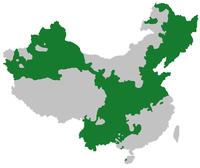|
In Chinese linguistics, Mandarin ( ) refers to a group of related Chinese dialects spoken across most of northern and southwestern China. Because most Mandarin dialects are found in the north, the group is also referred to as the "northern dialect(s)" ( ). A northeastern-dialect speaker and a southwestern-dialect speaker can hardly communicate except through the standard language, mainly because of the differences in tone. Nonetheless, the variation within Mandarin does not compare with the much greater variation found within several other varieties of Chinese, and this is thought to be due to a relatively recent spread of Mandarin across China, combined with a greater ease of travel and communication compared to the more mountainous south of China.
When the Mandarin group is taken as one language, as is often done in academic literature, it has more native speakers (nearly a billion) than does any other language.
For most of Chinese history, the capital has been within the Mandarin area, making these dialects very influential.
Mandarin dialects, particularly the Beijing dialect, form the basis of Standard Chinese, which is also known as "Mandarin".
|
|




 RSS
RSS